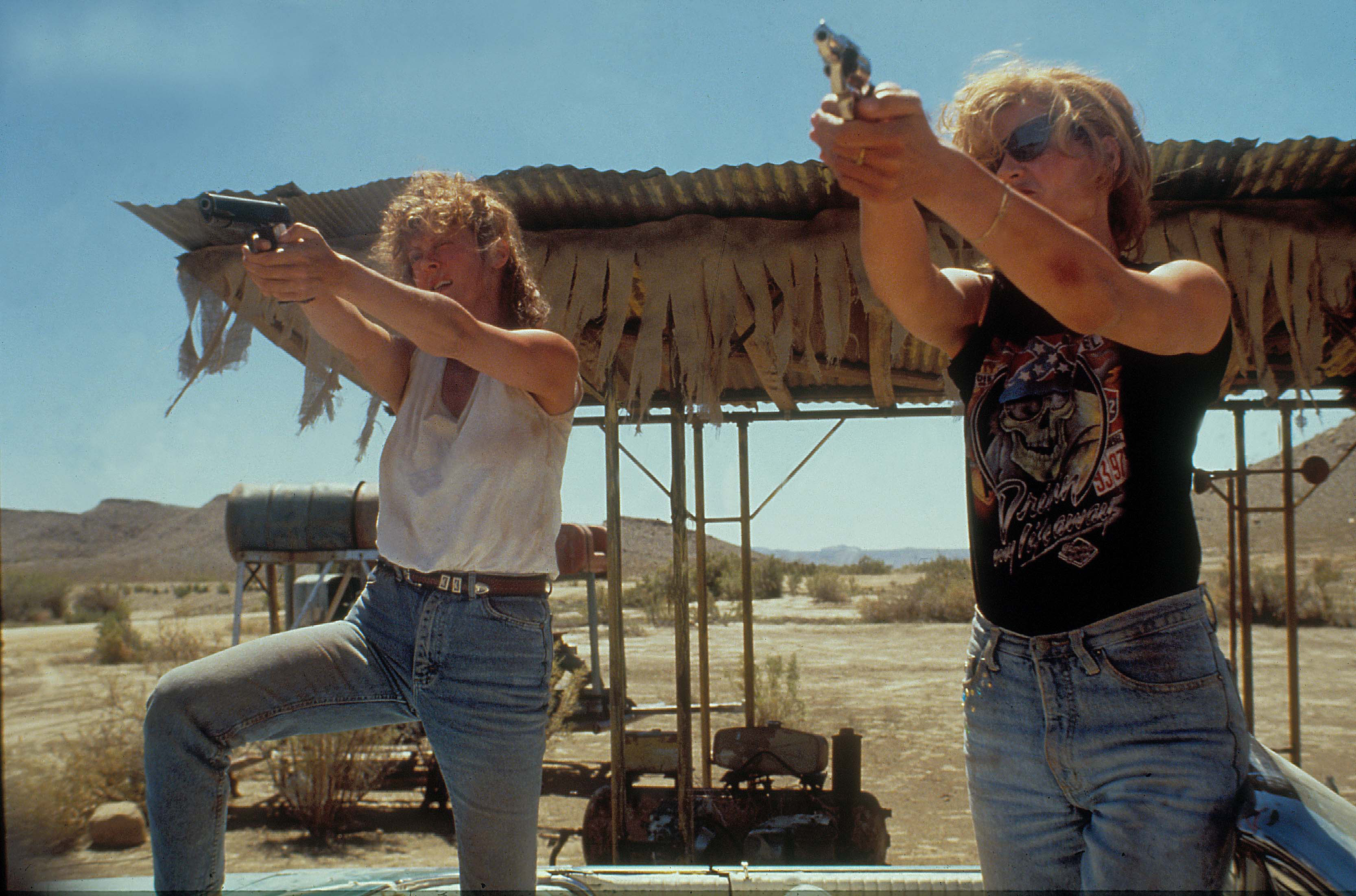Why Hollywood needs more female anti-heroes
On the enduring lessons of Thelma & Louise, 25 years later


A free daily email with the biggest news stories of the day – and the best features from TheWeek.com
You are now subscribed
Your newsletter sign-up was successful
"Oh my god, the world is ruined: The women have guns."
This, according to Geena Davis, was a typical overblown reaction when Thelma & Louise hit theaters 25 years ago. But the movie, which stars Davis and Susan Sarandon as two women whose girls' weekend road trip turns into a run from the law, is just as revolutionary today as it was in 1991. By giving two female friends weapons and enabling them to fight back against a system that oppressed them, it turned Thelma and Louise into action stars and complexly drawn anti-heroes. Thelma & Louise was a necessary step toward Hollywood representing female characters with complexities and flaws, but even 25 years later, the big screen rarely features anti-heroic women in starring roles.
Thelma & Louise's titular characters begin the 1991 film in positions of subservience: Thelma (Davis) treated miserably by her domineering, infantile husband, and Louise (Sarandon) working as a waitress and stewing because her boyfriend has abandoned her again. They decide they need a girls' weekend, pack up their belongings, and hit the road in Louise's baby blue Thunderbird convertible, heading for a cabin in the woods, a place beyond the reaches of domesticity. But when Louise shoots Thelma's would-be rapist during a pit stop, the two friends run for their lives, positive that no one will believe their story. As they drive further into the dust of Oklahoma, desperate and willing to do anything to evade capture, the two friends accrue quite a rap sheet: the first few crimes out of necessity, and the last just because they can.
The Week
Escape your echo chamber. Get the facts behind the news, plus analysis from multiple perspectives.

Sign up for The Week's Free Newsletters
From our morning news briefing to a weekly Good News Newsletter, get the best of The Week delivered directly to your inbox.
From our morning news briefing to a weekly Good News Newsletter, get the best of The Week delivered directly to your inbox.
Thelma and Louise were — and still are — unusual creatures in Hollywood. Few films give two women top billing. (As of 2014, only 12 percent of the top 100 grossing films of all time featured female protagonists.) Even rarer is the top-billed female action star. Marvel gladly throws in a spandex-wrapped female superhero or two for big tentpoles, but still hasn't made a single female-led superhero flick. Throughout Hollywood, women packing heat are confined to being characters in male-centric storylines, and are typically dressed to exude sex appeal. The few who do transcend their status as male accessories, like The Hunger Games' Katniss Everdeen, tend to stand firmly on the moral high ground, blessed with virtue and strength. But Thelma and Louise don't fit into this "strong female character" trope, one that was lambasted in The New York Times in 2011 because it doesn't allow room for any "character flaw or weakness that makes a character unpredictable and human."
Instead, Thelma and Louise make morally dubious decisions typically reserved for male anti-heroes — and in the process, they come across as both complex and relatable. They are aware that the world they live in wasn't built for them, even before they become outlaws. After Louise shoots Thelma's would-be rapist, Thelma wants to go to the police and tell the truth. But Louise knows that isn't an option. "Just about a hundred goddamn people saw you dance cheek to cheek with him all night! Who's gonna believe that?" she says. "We just don't live in that kind of world, Thelma." While morally reprehensible and traumatizing for both of the women, the act of murder — in which they prioritize their own safety and agency above the sanctity of the law — becomes a turning point.
The women soon need money, so Thelma holds up a grocery store. When they're pulled over for speeding, the pair overpowers the cop and locks him in the trunk of his car. When a truck driver who they run into several times makes crude gestures at them, Thelma and Louise convince him to follow them off the highway, where they blow up his truck. Over the course of the film, these acts escalate in scope and become acts of rebellion and self-expression from women who are used to holding back and being forced to submit to men's wills.
"Something's crossed over in me," Thelma tells Louise after she robs the grocery store. "I can't go back, I mean, I just couldn't live."
A free daily email with the biggest news stories of the day – and the best features from TheWeek.com

Thelma and Louise decide to continue living outside the law, which is enforced by a heavily male police force that seems to only protect piggish and small-minded men at the expense of women. The two make decisions wholly for themselves and with little regard for a moral code that seems biased against them, a relatable decision, given their circumstances.
Yes, the anti-hero has seen a well-documented burst of ubiquity in recent years, most notably in small-screen hits like The Sopranos, Mad Men, and Breaking Bad, along with films like The Dark Knight. And yes, popular entertainment seems as violent as ever. But nearly all of these anti-heroes and gun-toting action stars are men. This list of "The 25 Greatest Anti-Heroes in Movie History" includes only one woman, Lisbeth Salander from The Girl With the Dragon Tattoo. Though there are a few notable exceptions (like 2015's Jessica Jones and Mad Max: Fury Road), Thelma and Louise's use of violence to fully explore their potential as human beings stands nearly without rival. Their brand of independence shatters stereotypes of both one-dimensional and "strong" female characters.
In the film's famous final shot, the two women drive their car off a cliff into the Grand Canyon rather than give themselves up. A quarter century later, Thelma & Louise's gun-slinging anti-heroes are just as significant as the day they first drove across the silver screen and out into that abyss.
Katharine Schwab is a writer based in Washington, D.C. Her work has appeared in The Atlantic, The Seattle Times, and the San Francisco Chronicle. Follow her on Twitter.
-
 5 cinematic cartoons about Bezos betting big on 'Melania'
5 cinematic cartoons about Bezos betting big on 'Melania'Cartoons Artists take on a girlboss, a fetching newspaper, and more
-
 The fall of the generals: China’s military purge
The fall of the generals: China’s military purgeIn the Spotlight Xi Jinping’s extraordinary removal of senior general proves that no-one is safe from anti-corruption drive that has investigated millions
-
 Why the Gorton and Denton by-election is a ‘Frankenstein’s monster’
Why the Gorton and Denton by-election is a ‘Frankenstein’s monster’Talking Point Reform and the Greens have the Labour seat in their sights, but the constituency’s complex demographics make messaging tricky
